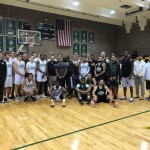The Need for Story
I'm watching a Forty-Niners game on a late Sunday morning when someone posts a Facebook video comparing the social networking service to chairs, basketball games, picnics and other deeply human experiences. Minutes later, I look up at the television and notice a Google Chrome commercial about a young woman going to college and communicating with her dad. As the commercial progresses, the audience realizes that her mom has died and that Google has helped facilitate their healing process.
In both cases, the technology companies aren't selling an audience on a service, platform or feature. Instead, they are telling stories. Not even big stories. Small stories. Humble stories. Human stories. They're reminding us that in an age where we have the world at the palm of our hands, we're still tethered to one another.
Neither service is claiming to fix anything. It's not Shamwow. It's not Ronco. There aren't any rock star celebrities promising that we can become sexy. Instead, they're suggesting that somehow their technology can be a part of the very social fabric that we weave together collectively.
The Rock Star-Superman-Shamwow Story
It has me thinking about stories in education. Currently, we are enamored with the rock star narrative. (Which is a bit odd, because kindergartners aren't all that great at crowd-surfing teachers and eighth graders struggle when the teachers asks them to cheer for an encore) We are waiting for Superman (creepy, both for the tights and the x-ray vision).
This rock star narrative assumes that most teachers are basically bad, that the system is essentially broken. It's the assumption that we need 55 Rules to fix our classrooms. It's the belief that Bill Gates, a man once known for broken Windows, will fix a complex social system. We've been duped by Khan artists selling snake oil and pseudo-reformers who fire principals on national television. On occasion, we honor teachers with awards and accolades, but mostly we assume that we need Supermen and rock stars and magicians to transform the system.
We Need to Become Visible
I can blame mainstream media for vilifying teachers. However, so much of what I see within the education community is for each other. We're sharing resources. We're explaining what works. We're telling stories. I have a whole community of teachers who I consider to be true friends. I can celebrate without it feeling arrogant. I can be vulnerable without feeling judged. We collaborate on projects. In other words, while the rock stars make it on the concert circuit, there is a beautiful jam session happening between teachers.
While the rock stars constantly selling a story, the jam session artists are telling a story.
It's collective. It's human. It's humble. That's why the public needs to hear the jam session narrative. They need to see that there are more powerful, humble things happening in classrooms than anything Superman could conjure up. Action figures may be exciting, but it's the first twenty minutes of Up! that move us to tears and cause us to rethink what truly matters.
It's for this reason that I believe in blogging and social media, not just as a method to reach fellow teachers, but as a way to speak to a larger audience. For all the talk of humanity and story-telling that the Facebook video advertises, the truth is that most of my Facebook experience is memes and political rants. As teachers, many of us have platforms like Facebook where we can tell the jam session narrative.
But here's the critical thing. The jam session narrative only works when it's real and humble and honest. True, we need share what works, but it's easier to believe in "what works" when someone is vulnerable about what fails. The world is worn-out from auto-tune. They want something real. And the only way to move away from the rock star narrative is to admit that we aren't rock stars.








